
Help for a government-supported Ordinal assortment from El Salvador demonstrates misunderstanding of what Bitcoin is actually for.
That is an opinion editorial by Jaime García, a Salvadoran-Canadian Bitcoiner and co-host of International Bitcoin Fest.
The hype around Bitcoin NFTs, made potential via inscriptions that use the Ordinal protocol, is plain. Dealer and artwork vendor Steven Hay has even advised that the government of El Salvador release an official Ordinal art collection to doubtlessly elevate cash to fund its proposed Bitcoin Metropolis or in any other case speed up Bitcoin adoption.
Sadly, this suggestion appears to lack an on-the-ground Salvadoran perspective and, in my opinion, is a blatant assault on El Salvador’s Bitcoin targets.
El Salvador turned to Bitcoin because of the qualities that make it sovereign money, one that isn’t beholden to international powers or organizations. Whereas a few the main worth propositions for utilizing Bitcoin in El Salvador are to draw non-public, international funding and to spur tourism, the promise of laborious cash that’s unconfiscatable, uncensorable and proof against manipulation is why El Salvador made bitcoin authorized tender.
Nevertheless, Ordinals don’t present any of the laborious cash advantages of Bitcoin.
NFTs On Bitcoin Are As Unhealthy As NFTs Elsewhere
The Bitcoin neighborhood has seen current, vivid examples demonstrating that NFTs are unhealthy investments.
For instance, a Malaysian investor who purchased Jack Dorsey’s first tweet NFT for $2.5 million struggled to find bids when he later tried to sell it. Even El Salvador President Nayib Bukele appeared to recognize the lack of real value in NFTs as he auctioned his tweet announcing the country’s Bitcoin Law approval in its legislative assembly — the NFT was by no means bought and Bukele didn’t pursue the endeavor any additional.
Quite a few maximalists and Salvadorans have been discouraging Bitcoin NFTs as a result of they consider that folk who get rug-pulled might undergo vital monetary hurt. For a lot of of those critics, defending Bitcoin’s social layer and calling out potential scams is important to preserving the Bitcoin community safe.
There are a number of key components that critics persistently convey up, which might display that Bitcoin NFTs on the Ordinal protocol are grifts and no completely different than NFTs on different protocols. These are as observe:
- The hype round NFTs is arbitrarily assigning exaggerated values to issues that aren’t inherently scarce.
- The Ordinal protocol cannot actually track individual satoshis as claimed by the creators and promoters of the protocol.
- The Bitcoin protocol is unaware of the inscriptions or Ordinals, so none of it’s verifiable by the community.
- There are debatable considerations on the influence of inscription exercise on storage assets of node runners.
- The NFTs scams are a big distraction from the integrity of Bitcoin’s major objective.
- Lastly, the mental dishonesty that markets Ordinals as “artwork funding” that may improve in worth over time.
Taking the above components into consideration, an El Salvador Ordinals purchaser dangers buying an costly, low-quality, reproducible picture that’s prone to lower in worth. Whereas there’s a legitimate argument that {the marketplace} will resolve whether or not it needs such a digital product, critics level out that individuals ought to pay attention to the inherent grift of the NFT house and the similarities to promotions of Ordinals.
To paraphrase the creator of Timechain Calendar, TC, who has spoken on this matter in a number of Twitter Areas conversations that I’ve heard, “A blockchain makes a really poor database. It solely works in Bitcoin as a result of it is just verifying the reality about Bitcoin transactions.”
One other Bitcoiner, Magoo, has opined in related Twitter Areas that including engineering complexity to the Bitcoin timechain or any software program is congruent with growing potential assault vectors. These assault vectors can seem not solely within the community itself but additionally within the social layer. As such, Ordinals have the potential to manifest assault vectors in every of those layers. It has inspired folks to focus their power on an exercise that Bitcoin was not designed or optimized for.
Ordinals Contradict Proof Of Work
Whereas the CEO of BTC Inc (which operates Bitcoin Journal), David Bailey, has argued that Bitcoin NFTs on the Ordinals protocol are compatible with Nakamoto consensus, they’re antithetical to Bitcoin as a result of their advertising and marketing means that they are going to improve in worth, and that violates the idea of proof of labor.
In the identical line of thought, Hay proposed {that a} authorities Ordinal assortment could be all profit and no danger, implying that it’s straightforward cash — however the ideas behind proof of labor demand that cash shouldn’t be straightforward to generate via pure regulation.
Saifedean Ammous wrote about this matter in a number of sections of his e-book “The Bitcoin Customary,” emphasizing that creating laborious cash requires an effort to supply worth and profit to the market and society. Ordinals are a high-time-preference exercise primarily based on straightforward cash and hypothesis; subsequently, encouraging El Salvador’s Bitcoin adoption acceleration by releasing an Ordinals assortment is peak fiat mentality.
Salvadorans Don’t Want Ordinals
El Salvador has a wealthy pool of creative expertise, together with musicians, actors, filmmakers, dancers, folklorists, writers, architects and visible artists. These Bitcoiners keen to assist the nation with its adoption will do effectively to help the present artist neighborhood by selling them and paying for his or her crafts through the use of bitcoin.
As a place to begin, Bitcoiners can go to the National Artisan Market, the place folks can discover work, indigo-dyed attire, hammocks and sculptures. Bitcoiners also can present alternatives to digital artists, comparable to graphic designers, via contracts for engaged on net initiatives, apps and in print, and so they can help digital content material creators by giving value-for-value ideas for his or her revealed works.
In the end, Salvadorans are more concerned about improving their day-to-day situations than accumulating JPEGs on cell phones. The on a regular basis Salvadoran calls for that their authorities give attention to safety, infrastructure, public transit, visitors, well being and schooling. Subsequently, issuing an NFT assortment is way from what Salvadorans worth.
Provided that El Salvador has had relatively positive success with its Bitcoin adoption, it’s straightforward to neglect that its present authorities had a tough begin and confronted a lot criticism with its formal Bitcoin adoption launch.
Many criticized the federal government’s release of the Chivo wallet over inadequate accompanying schooling and the technical challenges skilled by some customers. The first recipient for a lot of this detrimental suggestions was not the federal government itself, however Bitcoin as an entire, thereby hindering Bitcoin adoption.
Heading into Bitcoin’s second anniversary as authorized tender in El Salvador, among the detrimental perceptions created round Bitcoin are lastly starting to fade. But when the federal government have been to launch a Bitcoin NFT assortment, that might solely rewind the progress made.
The federal government should not promote Ordinals or NFTs, as many understand them as scams. El Salvador must generate confidence and belief, and when Ordinals, like NFT projects of the past, inevitably crash, El Salvador can’t be related to them. Sadly, any detrimental notion about Ordinals would result in reputational harm for the nation, which is exactly the place the assaults on Bitcoin adoption proceed.
The Bitcoin Mission is Clear
The Ordinals foyer has mounted an all-out psyops entrance, notably as particular teams of altcoiners are claiming that they are making Bitcoin “fun again.” Moreover, some are attempting to gain favor and buy influence by donating proceeds to non-governmental organizations (NGOs) NGOs just like the Human Rights Foundation, which has been critical of El Salvador.
Regardless of being inundated with all the Ordinal noise, it’s refreshing to see people like South Africa’s Bitcoin Ekasi work towards the Bitcoin mission with absolute readability. In a current tweet, the Bitcoin Ekasi staff mentioned it’s “not here to have fun” but to change the world. There’s a actual probability of failure for teams like Bitcoin Ekasi attributable to these distractions from the first mission of adopting the toughest cash on the earth. With that very same stage of readability, El Salvador should stay undeterred from these assaults.
It is a visitor publish by Jaime García. Opinions expressed are completely their very own and don’t essentially replicate these of BTC Inc or Bitcoin Journal.






More NFT News
Jack Dorsey-Backed Initiative Donates $21M to Bitcoin Nonprofit Opensats to Bolster Growth
6 Causes To Personal Bitcoin In Retirement
Is Shopping for XRP A Worthwhile Commerce? Crypto Analyst Says It’s “Useless”